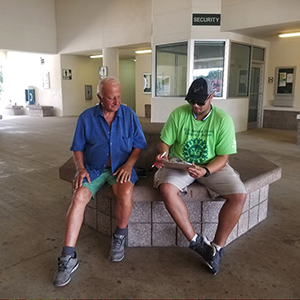 A long line of cars waits to evacuate in advance of Hurricane Floyd in 1999. ©Chad Norman, 2012.
A long line of cars waits to evacuate in advance of Hurricane Floyd in 1999. ©Chad Norman, 2012.
In the wake of a disaster, the decision to evacuate or not might seem cut and dried to those outside the affected region. In truth, many factors play into an individual's decision to stay or to go. Among these factors is social connectivity—how reliable are social connections, what type of connections exist, and how close are connections.
As people began to evacuate from Hurricane Irma in early September, University of South Florida researchers were at the ready to explore these how social connections were translating to evacuation decisions. The team of graduate and undergraduate students, led by Jennifer Collins, stationed themselves at Florida rest areas along Interstate 75 and the Florida turnpike to survey evacuees about their social networks and demographics. Shortly after the hurricane had passed, they interviewed others to determine why they stayed.

University of South Florida researcher Christian Santiago interviews a man evacuating from Hurricane Irma in September. ©Jennifer Collins, 2017.
The team—who were awarded one of the Natural Hazards Center's National Science Foundation-funded Quick Response Grants to conduct the research—wanted to learn if the density, diversity, and dependability of social connections influenced evacuation decision-making.
They found that evacuees had significantly more dense and diverse relationships, but the perceived dependability of social connections didn't seem to affect the decision to evacuate or not. This preliminary analysis of their work can be seen in context with previous quick response research conducted during Hurricane Matthew.
Read the full report of the initial findings in: